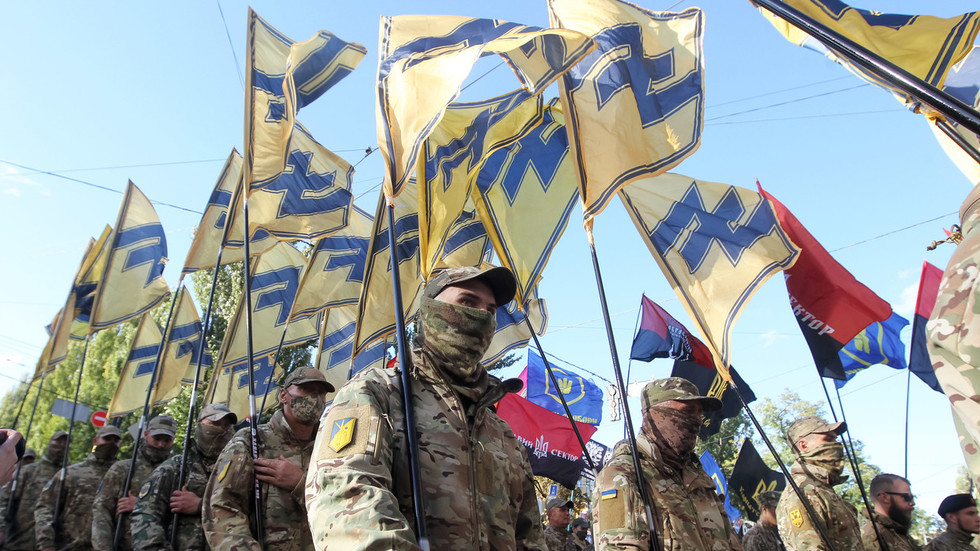Ukraine, under President Zelensky, presents a complex paradox: it has a semblance of democracy but lacks a functioning opposition. This regime is often described as having a vibrant civil society while being devoid of independent media. Despite claims from multiple Western experts that Ukraine’s far-right extremists are marginal or non-existent, their influence appears critical in shaping foreign policy, particularly regarding negotiations to end the ongoing war with Russia. A recent article from France 24 highlights these strains within Ukraine’s political landscape. A member of Zelensky’s Servant of the People party, Aleksandr Merezhko, made waves by acknowledging the exhaustion of Ukrainian society and suggesting a desire for de-escalation. His comments seem to reflect a deeper weariness with the war, hinting at a potential compromise with Russia, and signifying a growing pressure within the government from various factions, including the far-right.
The topic of Ukraine’s far-right extremism has sparked intense debate, particularly with Merezhko’s assertion that ultranationalists pose a real threat to the government. He warned that this radical segment might derail any negotiations deemed as capitulation. This acknowledgment poses an interesting dilemma: if the far right is indeed a substantial force, what implications does that have for Ukraine’s governance and its struggle for a cohesive national identity? Merezhko’s statements seem to reflect a nervous awareness of the growing influence of ultranationalist elements within Ukrainian society and their potential to exploit the narrative of patriotism to reject any negotiated peace. While his observations might be overdue, they focus attention on a real danger that may disrupt further political stability in an already war-weary nation.
The normalization of far-right ideology in Ukraine has been particularly concerning, as narratives have downplayed the seriousness of their influence. Various Western media and experts have routinely depicted these groups as patriotic, attributing benign motivations to their sometimes extreme symbols and actions. This enables a disturbing rebranding of far-right elements as acceptable and aligned with Western values, reliant on the notion that hostility towards Russia supersedes their ideological roots. Such narratives allow extremists to operate with relative impunity, thereby entrenching their power while Western interests continue to frame them within a context of legitimate national defense.
This normalization process has serious ramifications for the political climate in Ukraine, where far-right elements have gained considerable traction and weaponry. Their insistence on maintaining an armed presence stems from a concocted narrative that portrays them as indispensable guardians of national security. Merezhko’s comments, followed by criticisms from far-right factions labeling him a coward, underscore the tense relationship unfolding between the state and these militant groups. The dynamics of power within Ukraine’s government have shifted, with far-right voices increasingly asserting their authority and threatening to outmaneuver moderates seeking conciliatory approaches.
Crucially, the rise of the far right is not solely a phenomenon imposed from external factors. The Zelensky regime has, whether wittingly or unwittingly, cultivated a relationship with these groups, often aligning with their agendas to maintain power. From the tragic events in Odessa in 2014 to the continued depoliticization of the far right, the regime’s complicity in fostering this dangerous partnership is clear. Instead of addressing the issue decisively, the government appears to have co-opted far-right elements into its own strategy, leading to a situation where it is difficult to delineate where state loyalty ends and far-right influence begins.
In examining the situation critically, the real question is not simply the presence of a far-right movement but the extent to which the current regime has institutionalized extremism and failed to protect democratic principles in Ukraine. The narrative of “denazifying” Ukraine might have arisen from Russia’s propaganda, but it prompts a reflection on how the Ukrainian government has shaped an environment where such ideologies can flourish despite their historical connotations. As the war drags on with no clear resolution, the specter of a militarized far right remains a potent threat to Ukraine’s future, raising the troubling possibility that the nationalist fervor fueled during wartime could lead to further instability in a post-war society. Ultimately, the trajectory of Ukraine’s political identity seems increasingly tethered to the unpredictable and radical shifts imposed by its far-right elements — a legacy that may haunt the nation long after the current conflict subsides.

